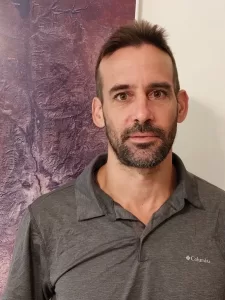
Zef M. Segal
Visiting Assistant Professor of Digital and Computational Studies and History
Associations
Digital and Computational Studies
History
About
Lecturer The Open University of Israel, 2012
Senior Lecturer College of Management Academic Studies, 2023
Education
BA The Open University of Israel, History, Philosophy, and Jewish Studies (2003)
BSc Tel Aviv University, Mathematics (2005)
MA Tel Aviv University, Philosophy (2005)
MSc Tel Aviv University, Mathematics (2008)
PhD Tel Aviv University, History (2013)
Research Interests
Dr. Segal studies the interconnections of media, mobility, and spatial thought in the 19th century, with an emphasis on journalism and cartography. His work integrates traditional historical approaches with digital and computational methods, such as GIS, network analysis, and textual reuse detection, to explore how communication and transportation infrastructures shaped perceptions of space and identity.
- Hebrew Journalistic Networks
Segal’s project Periodicals in Motion uses computational tools to analyze textual reuse and networked relationships across 19th-century Hebrew newspapers. This research highlights the role of the Hebrew press in constructing a national movement while simultaneously shaping transnational cultural exchanges. - Mapping Motion in Modern Cartography
His project Maps on the Move investigates how depictions of motion—winds, ocean currents, migration, and transportation—were integrated into 19th- and 20th-century European and American cartography. This work sheds light on how visual conventions of movement shaped political and cultural geographies. - Uniformity and Diversity in the U.S. Press
Segal’s ongoing collaborative project applies computational analysis to the U.S. press (1841–1884), examining patterns of textual diffusion and divergence during a period of national consolidation and sectional tension.
Across these projects, Segal emphasizes that media and maps are not passive reflections of the world but active agents in shaping spatial, cultural, and political understandings.
Courses Taught
DCS/History 212 Digital History Methods
DCS/History 305 Digital Maps, Space, and Place
DCS/History 375 Network Analysis
DCS/History 2XX Old Newspapers, New Questions: Digital Perspectives on the Press and Local History
DCS/History 3XX Mental Geographies with LLMs: Spatial Analysis of Mark Twain’s Travel Writing
Selected Publications
Segal, Z. & Nurit Melnik. Computational Literacy for the Humanities: Mathematics and Programming in Context. Routledge, 2025. https://doi.org/10.4324/9781003502814
Segal, Z. The Political Fragmentation of Germany: Formation of German States by Infrastructures, Maps, and Movement, 1815–1866. Palgrave Macmillan, 2019. https://doi.org/10.1007/978-3-030-19827-5
Segal, Z. & Bram Vannieuwenhuyze (eds.). Motion in Maps, Maps in Motion. Amsterdam University Press, 2020. https://doi.org/10.1515/9789048542956
Zef Segal, “The Fantastic Geographies of Ikhtayyi: On Space and Place in Emile Habibi’s Novel” in Christian Lenz, Sarah Neef and Kristin Aubel (eds.), Spaces and Places in the Fantastic: Exploring Fantastic Geographies (Newcastle-upon-Tyne: Cambridge Scholars Publishing, 2025), 53-76.
Segal, Z. “Between Science and Commercialism: Maps in a 19th-Century Hebrew Journal.” The Communication Review 27.2 (2024): 197–218. http://dx.doi.org/10.1080/10714421.2024.2331031
Segal, Z. “Fake News in the Early Hebrew Newspaper: Sensationalist Journalism within an Objective Journal, HaTzfira 1874.” Journalism History 49 (2023): 300–315. https://doi.org/10.1080/00947679.2023.2266175
Zef Segal, “From a Local Periodical to a Global Enterprise: Ha-Me’asef, 1896- 1914”, Journal of Historical Network Research 6.1 (2021), 192-219. https://doi.org/10.25517/jhnr.v6i1.89
Zef Segal & Oren Soffer, “One Journal, One Decade, 3,797,592 Words: Computational Analysis of HaTzfira’s Discourse (1874–1883),” Journal of Jewish Studies 72.2 (2021), 369-396. https://doi.org/10.18647/3508/jjs-2021
Zef Segal & Oren Soffer, “From Weekly to Daily: Computational Analysis of Periodical Time Cycles,” Journalism Studies 21.14 (2020), 1952-1972. https://doi.org/10.1080/1461670X.2020.1807394 “
Current Courses
Winter Semester 2026
Old Newspapers, New Questions: Digital Perspectives on the Press and Local History
This course explores newspapers as multidimensional historical artifacts through the lens of digital humanities. Students will investigate newspapers not only as sources of information but also as cultural products reflecting discourse, power structures, and communication practices. Combining histor…
Network Analysis
Networks are everywhere. They describe how people, organisms, and ideas connect and interact. Studying networks reveals patterns, systems, and frameworks that are, in many cases, otherwise invisible. This course introduces network analysis as a tool that offers insights into the construction of soci…
Short Term 2026
Mental Geographies with LLMs: Spatial Analysis of Mark Twain’s Travel Writing
This short, intensive course experiments with how Large Language Models (LLMs) can help uncover the “hidden meanings” of space in historical texts. Focusing on Mark Twain’s travel letters and columns, students will integrate close reading, iterative prompt design, and digital mapping to explor…